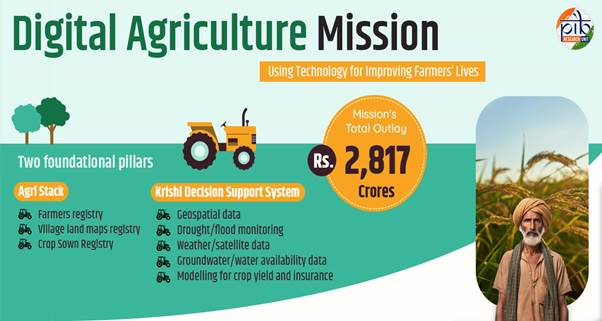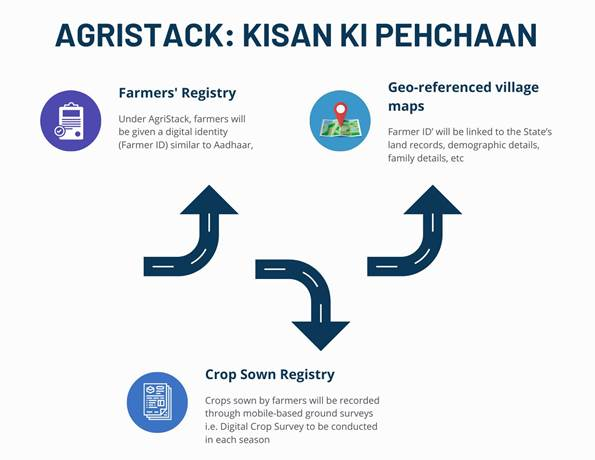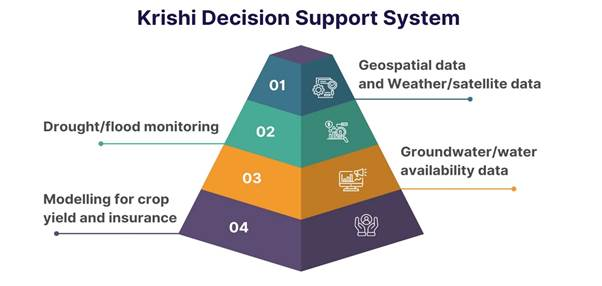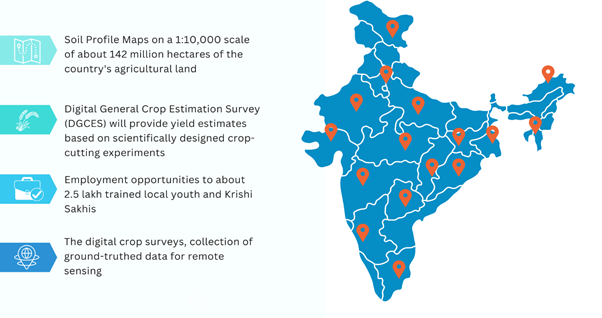Agriculture
7 New Schemes to Boost Farmer Income
- 03 Sep 2024
- 12 min read
For Prelims: Agriculture and allied sectors, livestock and horticulture, the Digital Agriculture Mission (DAM), Agri Stack, Krishi Decision Support System, Indian Council of Agricultural Research (ICAR), the New Education Policy 2020, Krishi Vigyan Kendras
For Mains: Role of technology in Indian agriculture sector.
Why in News?
Recently, the Union Cabinet announced seven new schemes with a total outlay of nearly Rs 14,000 crore for the agriculture and allied sectors.
- The schemes are centered on advancing research and education, enhancing climate resilience, optimising natural resource management, promoting digitization within the agriculture sector, and development of livestock and horticulture.
- The overarching objective of these initiatives is to equip farmers with the necessary capabilities for adopting climate-resilient agricultural practices.
What are the Key Schemes?
- The Digital Agriculture Mission (DAM): The Digital Agriculture Mission has two foundation pillars which are Agri Stack and Krishi Decision Support System.
- Agri Stack: It is a collection of technologies and digital databases that focuses on farmers and the agricultural sector.
- AgriStack will create a unified platform for farmers to provide them end to end services across the agriculture food value chain.
- Under the programme, each farmer will have a unique digital identification (farmers’ ID) that contains personal details, information about the land they farm, as well as production and financial details.
- Each ID will be linked to the individual's digital national ID Aadhaar.
- Agri Stack: It is a collection of technologies and digital databases that focuses on farmers and the agricultural sector.
- Krishi Decision Support System: It aims to integrate and store in a standardised form relevant geospatial and non-geospatial data, such as remote-sensing data, weather data, soil data, crop signature library, reservoir data, groundwater data, and data pertaining to Government schemes.
- Soil Profile Mapping:
- Under this, detailed soil profile maps on a 1:10,000 scale for approximately 142 million hectares of agricultural land have been envisaged, with 29 million hectares of soil profile inventory already being mapped.
- The Crop Science for Food and Nutritional Security programmes: These are anchored on six key pillars, advancing research and education, managing plant genetic resources, genetic enhancement of food and fodder crops, improvement of pulse and oilseed crops, research on entomology, microbiology, and pollination, as well as the advancement of commercial crop varieties.
- Strengthening Agricultural Education, Management and Social Sciences: It aimed at bolstering agricultural education, management, and social sciences under the aegis of the Indian Council of Agricultural Research (ICAR).
- This initiative seeks to modernise agricultural research and education in alignment with the New Education Policy 2020.
- The programme will emphasise on cutting-edge technologies such as Digital DPI, AI, big data, and remote sensing. Additionally, it will encompass components focused on natural farming and climate resilience.
- Sustainable livestock health and production: This scheme was dedicated to enhancing sustainable livestock health and production, with the objective of augmenting farmers' income from livestock and dairy sectors.
- This scheme will prioritise areas such as animal health management, veterinary education, advancements in dairy production and technology, animal genetic resource management and improvement, as well as animal nutrition and the development of small ruminants.
- Sustainable development of Horticulture: The Cabinet has also approved a significant scheme focused on the sustainable development of horticulture.
- This initiative aims to enhance farmers' income through the cultivation of horticultural crops.
- The programme encompasses a wide range of crops, including tropical, subtropical, and temperate horticultural varieties; root, tuber, bulbous, and arid crops; as well as vegetables, floriculture, mushroom crops, plantation crops, spices, medicinal, and aromatic plants.
- Krishi Vigyan Kendras (KVKs): Krishi Vigyan Kendras aim to bolster agricultural extension services and sustainable resource management practices nationwide.
- KVK aims to evaluate location specific technology modules in agriculture and allied enterprises through technology assessment, refinement and demonstration.
- Natural Resource Management (NRM): NRM scheme was also approved by the cabinet.
- It is the sustainable use of natural resources to meet current needs while ensuring future generations can meet their own needs.
What is the Role of Technology in the Agricultural Sector of India?
- Crop Preparation Stage:
- Soil Health Monitoring: Advanced soil sensors and remote sensing technologies enable precise monitoring of soil health and nutrient levels. This allows for targeted application of fertilizers and soil amendments, enhancing soil fertility and sustainable agricultural practices.
- Agricultural Machinery: Mechanisation has been a critical driver of productivity in the agrarian sector. The adoption of modern agricultural machinery has significantly increased operational efficiency and reduced labour costs, contributing to higher agricultural output.
- Biotechnology: It has facilitated the development of genetically modified crops that are resistant to pests and diseases, drought-tolerant, and yield-enhanced. These innovations have led to increased agricultural productivity, reduced crop losses, and improved crop quality.
- Cultivation Stage:
- Role of Drones: Drones, or Unmanned Aerial Vehicles (UAVs), have emerged as transformative tools in agriculture. They are extensively used for aerial seeding, precision pesticide spraying, and remote data collection, facilitating research and enhancing farm management practices.
- Role of Agri-Tech Startups: Agri-tech startups play a pivotal role in driving agrarian change by introducing innovative technologies and modern agricultural practices.
- They contribute to advancements in farming techniques, improve efficiency, and enhance access to finance, thus revolutionizing the agriculture sector.
- Climate Adaptation Technologies: Innovations such as climate-resilient crop varieties and weather prediction tools help farmers adapt to changing climatic conditions.
- These technologies support the development of strategies for mitigating climate-related risks and ensuring crop survival.
- Renewable Energy Integration: The adoption of renewable energy technologies, such as solar-powered irrigation systems and biogas production, supports sustainable agricultural practices. T
- hese innovations reduce dependence on fossil fuels and lower energy costs for farmers.
- Harvesting Stage and Food Processing:
- Supply Chain Optimization: Technology-driven solutions, such as blockchain and IoT (Internet of Things), enhance the transparency and efficiency of agricultural supply chains. These technologies improve traceability, reduce transaction costs, and ensure timely delivery of products.
- Precision Livestock Farming: Technologies such as wearable sensors and monitoring systems for livestock provide real-time data on animal health, behavior, and productivity. This allows for improved management of livestock and enhanced animal welfare.
- Food Processing and Preservation: Technological advancements in food processing and preservation have ensured that food remains safe and has an extended shelf life.
- These techniques have minimised food wastage and improved the efficiency of food storage and transportation, enhancing overall food security.
- Market Access: Technology has revolutionized market access for farmers, enabling them to reach both local and international markets.
- The rise of the internet and e-commerce platforms has empowered farmers to connect directly with buyers, bypassing intermediaries and increasing profitability.
- Digital Platforms for Knowledge Sharing: Digital platforms and online forums facilitate the dissemination of agricultural knowledge and best practices.
- Farmers can access expert advice, educational resources, and peer support, leading to better-informed agricultural decisions.
What are the Key Initiatives Related to Agriculture?
- Pradhan Mantri Fasal Bima Yojana (PMFBY)
- Soil Health Card Scheme
- Pradhan Mantri Krishi Sinchai Yojana (PMKSY)
- e-National Agriculture Market (e-NAM)
- Paramparagat Krishi Vikas Yojana (PKVY)
- Digital Agriculture Mission
- Unified Farmer Service Platform (UFSP)
- National e-Governance Plan in Agriculture (NeGP-A)
- Mission Organic Value Chain Development for North Eastern Region (MOVCDNER)
Conclusion
While agri-tech holds substantial promise for transforming India's agricultural landscape through enhanced productivity, efficiency, and sustainability, its successful implementation is contingent upon overcoming several critical challenges. Additionally, integrating agri-tech with traditional practices, addressing regulatory and policy gaps, and considering environmental and social impacts are essential for fostering an inclusive and sustainable agrarian transformation.
|
Drishti Mains Question: Discuss the role of agri-tech in transforming India's agriculture sector. Highlight the key challenges associated with its implementation and suggest measures to address these issues? |
UPSC Civil Services Examination, Previous Year Question (PYQ)
Prelims
Q. In India, which of the following can be considered as public investment in agriculture? (2020)
- Fixing Minimum Support Price for agricultural produce of all crops
- Computerization of Primary Agricultural Credit Societies
- Social Capital development
- Free electricity supply to farmers
- Waiver of agricultural loans by the banking system
- Setting up of cold storage facilities by the governments
Select the correct answer using the code given below:
(a) 1, 2 and 5 only
(b) 1, 3, 4 and 5 only
(c) 2, 3 and 6 only
(d) 1, 2, 3, 4, 5 and 6
Ans: (c)
Mains
Q. How can the ‘Digital India’ programme help farmers to improve farm productivity and income? What steps has the Government taken in this regard? (2022)
Q. What are the present challenges before crop diversification? How do emerging technologies provide an opportunity for crop diversification? (2021)










